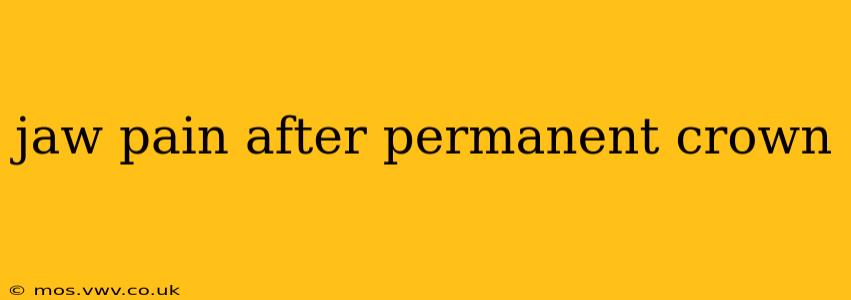Experiencing jaw pain after getting a permanent crown is understandably concerning. While it's not uncommon to have some initial discomfort, persistent or severe pain warrants attention. This comprehensive guide explores the potential causes of jaw pain following crown placement, effective treatment options, and preventive measures to ensure a comfortable recovery.
What Causes Jaw Pain After a Permanent Crown?
Several factors can contribute to jaw pain after receiving a permanent crown. Understanding these potential causes is the first step towards finding relief.
-
Improper Bite: A poorly fitted crown can alter your bite, leading to misalignment and jaw muscle strain. This is a common culprit and often the reason for post-crown discomfort. The crown might be too high, too low, or improperly positioned, causing your teeth to meet unevenly.
-
Inflammation and Irritation: The process of placing a crown can cause some minor inflammation and irritation of the gums and jaw muscles. This usually subsides within a few days, but persistent pain suggests a more significant issue.
-
TMJ Issues (Temporomandibular Joint Disorder): Existing or exacerbated TMJ problems can manifest as jaw pain after a crown. The crown, even if perfectly fitted, could aggravate pre-existing TMJ conditions. Symptoms might include clicking, popping, or limited jaw movement.
-
Sinus Infection: While less common, a sinus infection can sometimes mimic jaw pain, especially if the infection is near the upper molars. Pain radiating to the jaw is a potential symptom of sinusitis.
-
Underlying Dental Problems: Pre-existing dental issues, such as an abscess or infection under the crowned tooth, may not have been fully resolved before crown placement, resulting in continued or worsened pain.
-
Stress and Bruxism (Teeth Grinding): Stress can exacerbate bruxism (teeth grinding or clenching), putting extra pressure on the jaw and potentially causing pain after receiving a crown. This is particularly relevant if the crown is placed on a molar.
How Long Should Jaw Pain After a Crown Last?
Mild, temporary discomfort for a few days after crown placement is generally expected. However, persistent or worsening pain lasting more than a week, intense pain, or pain accompanied by other symptoms (fever, swelling) requires immediate attention from your dentist. Don't hesitate to contact your dental professional if you're experiencing significant or prolonged jaw pain.
What to Do if You Have Jaw Pain After a Permanent Crown?
Your first step should always be to contact your dentist. They can accurately diagnose the cause of your pain and recommend appropriate treatment.
-
Over-the-counter pain relievers: Your dentist might recommend over-the-counter pain relievers like ibuprofen or acetaminophen for temporary pain relief while awaiting an appointment. However, these should not be relied upon as a long-term solution.
-
Adjustments to the crown: If the crown is ill-fitting, your dentist might need to make adjustments to improve your bite and alleviate the pain. This is a common solution for pain caused by improper bite.
-
Other treatments: Depending on the cause, your dentist may recommend other treatments, including muscle relaxants, physical therapy, or splints to help manage TMJ disorders or bruxism.
Can a Permanent Crown Cause Long-Term Jaw Pain?
While most jaw pain related to permanent crowns is temporary, improperly fitted crowns or untreated underlying conditions can lead to long-term jaw pain. Early diagnosis and prompt treatment are crucial to prevent chronic discomfort. Ignoring the pain can allow the problem to worsen, potentially leading to more extensive and costly treatment in the long run.
How to Prevent Jaw Pain After a Permanent Crown?
-
Choose an experienced dentist: Selecting a highly skilled and experienced dentist is crucial for minimizing the risk of complications. Look for dentists with expertise in crown placement and restorative dentistry.
-
Open communication: Maintain open communication with your dentist throughout the process. Report any discomfort or concerns immediately, no matter how minor they might seem. Don't wait for the pain to become severe.
-
Follow post-operative instructions: Carefully follow your dentist's post-operative instructions regarding diet, oral hygiene, and activity limitations. This contributes to a faster and smoother recovery.
-
Manage stress and bruxism: If you suffer from bruxism, consider stress management techniques and discuss the use of a nightguard with your dentist to protect your teeth and jaw.
By understanding the potential causes of jaw pain after a permanent crown and taking preventive measures, you can significantly increase your chances of a comfortable recovery and avoid long-term issues. Remember, prompt communication with your dentist is key to resolving any problems effectively.
